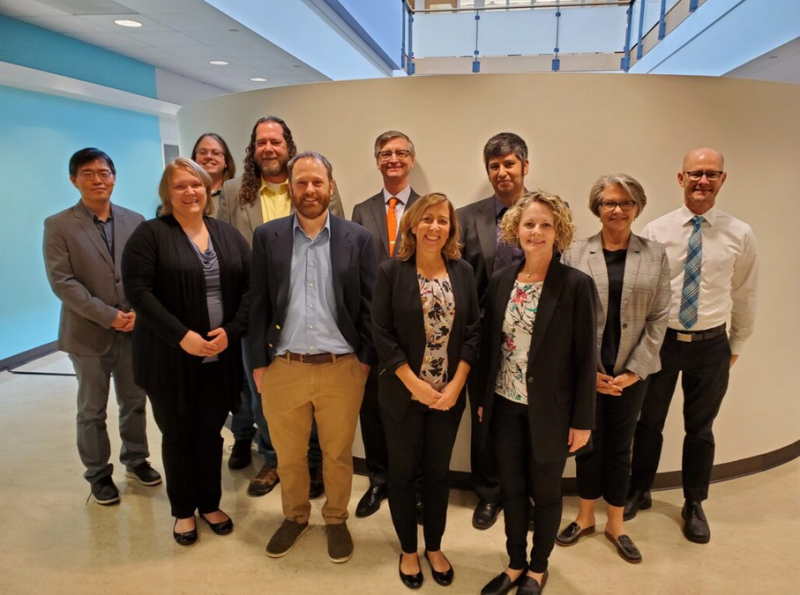The Delta supercomputer, funded by the National Science Foundation to replace the decommissioned Blue Waters on the U of I campus. The Resource Allocation System for the XSEDE network—a large consortium pooling supercomputing resources—used from 2014 to its retirement on August 31. Its successor, the ACCESS network. Amy Schuele points these achievements as the high points of her career. Formerly the associate director for cyberinfrastructure at the National Center for Supercomputing Applications, she retired in July after 31 years with the organization. Her departure, in addition to being a loss to NCSA, is a bittersweet moment: seeing a woman retire from a high-ranking position after a long career is sadly remarkable in a field that continues to be overwhelmingly male.
Schuele’s C.V. takes after that of a traditionally successful tech executive: a bachelor’s degree in computer science from the U of I, five years as a software engineer at Boeing, 21 as a network and database engineer at NCSA, then 10 in management before her retirement. However, she does not consider her career conventional. For 20 years as an NCSA engineer, she worked part time. She scaled her time back during a period of uncertain funding. However, she is grateful when she looks back because it allowed her to work while raising her family. Then, when the opportunity for promotion came along, Schuele was able to enter the leadership track without resistance. “NCSA let me run when I was ready to run,” she said. “They didn’t hold me back because I had been part time for so long.”
She points to her unconventional path as an example of how computer science could be made more accessible: “They let me be different, and it worked for me. I think it could work for others.” To her, understanding that everyone has a different background, circumstance, and skillset is key to improving the field. She emphasizes that diversity is a very practical advantage: it is by hearing more perspectives than those which have always been heard that truly novel and revolutionary solutions manifest. As an example, she told me about the work of JooYoung Seo, a professor of information sciences at the U of I using sound to represent data to people with limited vision. Developing an additional mode of representation opens the possibility of added depth to visual graphs and diagrams: what if plots showing two or three spatial dimensions had a moving speaker whose volume conveyed additional features that cannot be drawn?
While Schuele thinks computer science is making strides towards accessibility and diversity, she knows there is still work to do. Her team’s work on the funding application for Delta explored how those with limited vision would access it. They expected the main issue would be the act of logging on to the system, but they found the barriers go as deep as knowing the opportunity is available and being able to apply for time. Schuele believes that it is necessary to go all the way back to the beginning to reform the field as a whole. This means reframing computing as something pushing past the archetype of the basement hacker poring over video games and dark web forums. It means presenting computing as a tool to solve societal problems and change lives. She believes this will draw more people from traditionally underrepresented groups to the field at earlier points in their development.

Schuele with NCSA leadership at the ACCESS award ceremony in Research Park. Photo from NCSA website.
Schuele is the third woman leader to retire from NCSA in the last year after more than 30 years (Donna Cox and Michelle Butler are the other two). She is quick to express gratitude to NCSA for supporting her throughout her tenure, but she believes “seeing people that looked more like [her]” might have made her journey easier. “It’s probably no surprise that one of the biggest challenges that I had was, often, I was the only female in the room,” she observed. Even when she entered the leadership track and had Cox and Butler, who had risen before her, to look to, they were the only examples she had within the organization. Schuele brought these two figures up on several occasions as we spoke and corresponded. It is clear that they are important to her, and this speaks to something beyond personal admiration and friendship: the importance of knowing that one is not alone in wanting to do what they do and having people who understand to support.
When asked what advice she would give to someone just entering the field, Schuele says it is most important to “try different things until you find what really makes you get up and work hard.” She cites her transition to databases early in her time at NCSA: she now considers data to be her true passion, and she would not have found it if she had declined to temporarily help the database group while she was still a network engineer. She is, to say the very least, a competent computer scientist to change specialties several times (She had worked with graphics at Boeing.). More than that, one gets the sense her persistence is driven by her love of the subject that emanated throughout our conversation. She fondly remembers how a class in Fortran at Parkland College inspired her to switch to computer science from math education. A highlight from her experience at Boeing is the Ada programming language, whose features and advantages we discussed in a lengthy aside. Her nontraditional path does not diminish her street cred but enhances it. On her self-described unconventionality, she feels it is important to note that she is “different in a lot of ways, but similar in a lot of ways.”








